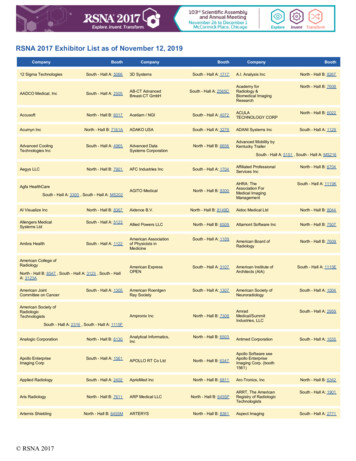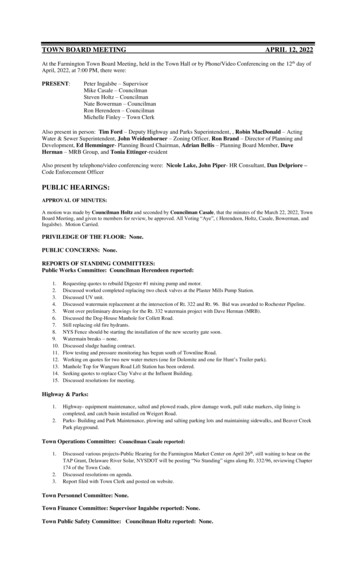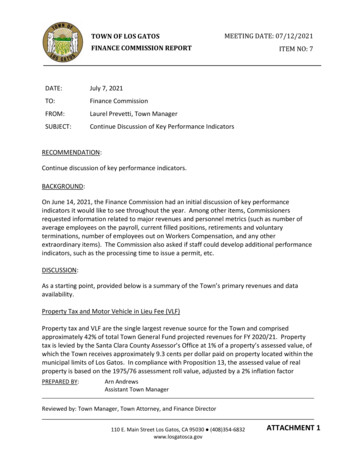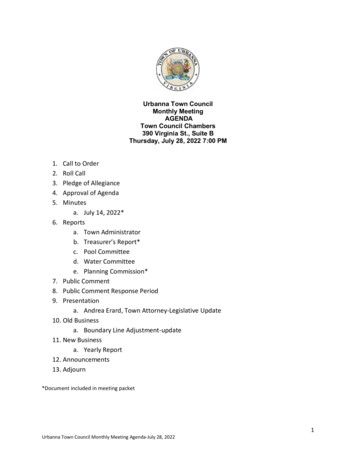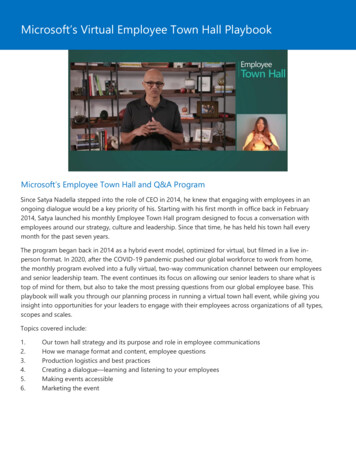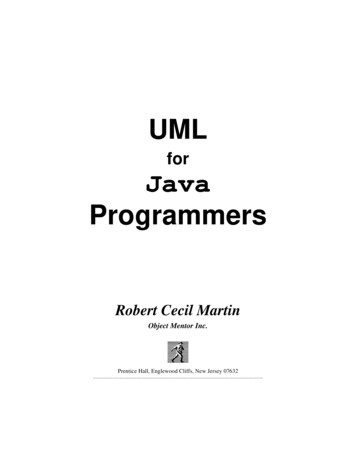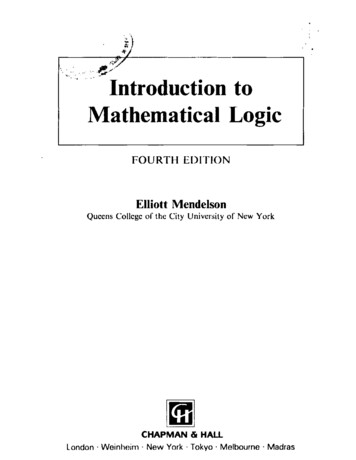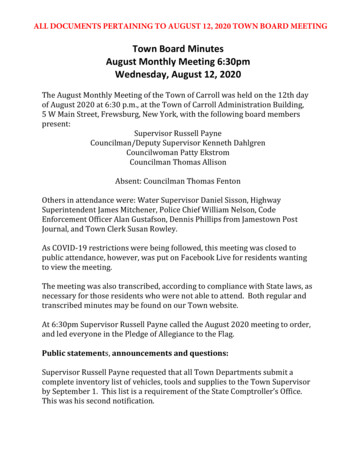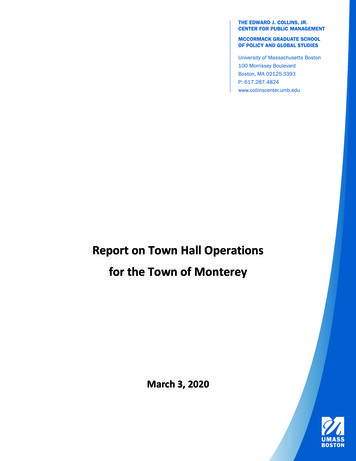
Transcription
Report on Town Hall Operationsfor the Town of MontereyMarch 3, 2020
ContentsOverview . 1Findings . 2Day-to-Day Management. 2Management of Major Projects . 3Financial Management . 3Human Resources (HR) Management. 4Information Technology (IT) Management . 6Procurement/Purchasing . 6Town Hall Culture . 7Recommendations . 8Background . 16Relevant Recent Background in Monterey . 16History of Evolution to Professional Town Administration in Massachusetts . 18
OverviewThe Town of Monterey retained the Collins Center for Public Management at UMass Boston to review thefunctions and services performed at Town Hall in order to provide a high-level, outside view of thestrengths and weaknesses of current operations and recommend whether or not the Town would be wellserved by a Town Administrator.In order to accomplish this, the Collins Center project team conducted interviews with many staff, electedand appointed officials, and other stakeholders and reviewed a significant number of documents andfinancial information provided by the Town. The project team would like to thank the Select Board, all ofthe interviewees, and especially Melissa Noe, the Town’s Administrative Assistant, for her assistance incoordinating the logistics and information-gathering phase of the project.The Town has taken many important, positive steps in the past five or so years, including: Changing the Treasurer and Town Clerk positions from elected to appointed;Prioritizing professional staffing in financial positions;Committing to an annual financial audit;Seeking a review of its financial operations from the Commonwealth’s Division of Local Services;Conducting periodic reviews of its IT function through an external expert; andConsidering carefully the benefits (and drawbacks) of a Town Administrator.Further, Monterey has a rich and vibrant tradition of residents playing an important role in the Towngovernment and many dedicated, long-serving employees. There were many individuals that the projectteam spoke to that expressed deep caring for the Town and a desire to help the Town move forward.This report lays out a path forward for Monterey to begin to address in a strategic manner some of theremaining challenges that the Town faces.1
FindingsAs with virtually all municipalities, the Town of Monterey performs some Town Hall operations well andalso has some areas for improvement. The discussion below covers day-to-day management,management of major projects, financial management, human resources (HR), information technology(IT), procurement/purchasing, and the culture in Town Hall.Day-to-Day ManagementIt is clear that the Select Board faces challenges in carrying out the role of day-to-day management andoversight. This is due to the fact that, as the Restructuring Committee wrote in 2015, “over the years boththe complexity and the amount of work for the Select Board has increased dramatically.1” It is unlikelythat the Select Board can effectively address the management and oversight deficits because, asvolunteers, members lack the technical knowledge and professional expertise in critical municipalfunctions. The Select Board likely does not have the capacity to keep apprised of changes in state law andregulations and industry best practices. Further, the nature of an elected board means there is a potentialfor a lack of consistency over time. While policies and strategies can and should reflect the changingpreferences of Town residents through elections, matters such as accounting, cybersecurity,procurement, and human resources must reflect state and federal laws and regulations and be guided bybest practice and not by the preferences of elected officials. It is important to note that none of this isunique to Monterey. The world in which Massachusetts towns operate has grown increasinglycomplicated and will continue to do so at an accelerating pace. Changes in state and federal law,information technology, and resident expectations present significant challenges in municipalities acrossMassachusetts. However, the impacts can be heightened where elected, part-time boards operatewithout the support of a professional manager.While Select Board members can and often do have a regular physical presence in Town Hall, this isdistinct from the consistent presence of a professional manager with the authority to manage keyprocesses, such as budgeting and capital planning, or to deal with personnel issues. The MassachusettsMunicipal Association (MMA) Handbook for Massachusetts Selectmen states: “Town government in NewEngland is largely government by committee, and the legal authority of selectmen is limited to actionstaken by the board at a legally called, posted meeting with a majority of the board present.2” Thus, aMonterey Select Board member as an individual sitting in Town Hall has no authority and may not actindependently of the Board (unless specifically authorized).The requirements of Massachusetts’ Open Meeting Law mean that the Board must carry out deliberationsand decisions at a public meeting. Further complicating matters in Monterey is that, as a three-memberboard, a quorum is reached with just two members. Thus, there are strict and severe limitations oncommunication between Board members outside of a meeting conforming to the Open Meeting Law.These restrictions, while conveying benefits such as transparency, mean that the Select Board must1Klein, Larry, et al. The Report and Recommendations of the Ad-Hoc Restructuring Committee. June 2015, pg. 1Ouellette, John, editor. Handbook for Massachusetts Selectmen. Massachusetts Municipal Association, fourthedition, pg. 322
manage and resolve relatively insignificant issues in this manner because it does not have the benefit ofrelying on a Town Administrator. Timelines can be quite drawn out based on the meeting schedule andposting requirements. In the case of relatively insignificant issues or routine decisions, this is an inefficientway of operating and diverts the Select Board’s limited time away from more appropriate tasks andimportant decisions.Management of Major ProjectsWhile Select Board members have historically devoted much time and effort to managing major projectsand initiatives, interviews revealed disagreement as to whether the Board’s management has beenadequate. For example, interviewees discussed the multiple attempts to hire a Town Administrator withsuboptimal outcomes, the Community Center, and several major capital projects. Much more informationand investigation would be required to understand the complexities and challenges of specific projects,so it is outside the scope of this report to comment on the management of any specific initiatives andprojects. However, it seems likely that the Select Board faces challenges in managing complex, longerterm projects due to the nature of the Board, namely that it is a part-time, volunteer, and elected boardwhose membership may change in the middle of a project. All of these characteristics make it moredifficult to manage major projects. Contrast this with a municipality that has a Town Administrator whocan provide professional analysis, project management, and support to the Select Board to improveprocesses and outcomes related to major projects.Financial ManagementMonterey has made great strides in professionalizing its financial operations within the past five years andshould be commended. Specifically, the transition from an elected to an appointed Treasurer was asignificant, positive change. Also, whereas several years ago there were issues with substandard work,unfinished tasks, delays in key processes with the State, sudden departures, and high turnover in thepositions of Treasurer and Accountant, the Town has more recently been contracting out these functionsto professional firms, and the Select Board, in conjunction with the Town’s Auditor, has been providingadequate, high-level oversight. Also, the Town has committed to regular, annual audits, taking therecommendation of the State Division of Local Services. It should also be noted that the Town is wellserved by the incumbent Tax Collector and long-serving Assessor and Board of Assessors. The TaxCollector position, though still elected, is currently held by a long-serving incumbent who by all accountshas the skills and expertise to perform the job to professional standards. The Town, through the effortsof many staff and elected and appointed officials, has also been quite successful at seeking and receivinggrants.That said, the Center project team believes there is opportunity for improvement in the Town’s financialoperation. Most important is clarifying the responsibility for and ensuring the completion of three keyfinancial functions: forecasting, budgeting, and capital planning. A financial forecast is a multi-yearprojection of revenues and expenses. It is a key process intended to provide the context necessary tomake appropriate decisions and plan for a successful future as well as to provide a foundation for theannual operating and capital budgets and longer-term capital plan. It seems that the Town of Monterey,like many Massachusetts municipalities, does not have a financial forecast. The Town does have a listing3
of capital assets with rudimentary projections of future cost, but it cannot truly be called a capital planbecause there is seemingly no financial strategy around capital expenditures and little evidence of arobust process of assessing capital needs. In terms of the annual operating budget, there has apparentlybeen a shift in the recent past from the Select Board to the Finance Committee in terms of primaryresponsibility for managing the budget process. It seems that this is an ongoing process of reorganizingthe roles and responsibilities for the budget between the Select Board and Finance Committee. TheTown’s by-laws provide little direction on this topic outside of establishing the Finance Committee inaccordance with Massachusetts General Law Chapter 39, Section 19 which provides that “suchcommittee, or the selectmen if authorized by a by-law of the town, and, in any town not having such acommittee, the selectmen, shall submit a budget at the annual town meeting.”Another opportunity relates to financial policies and procedures. It was reported that several years agothe Town lacked key financial policies and procedures. Although the financial services vendor at the timeworked to implement some standardized procedures, it was reportedly a challenging process and onethat achieved the minimum required by the vendor to be able to provide services, for example makingthe use of a timesheet standard practice or setting a travel reimbursement policy. The Select Board has,over the better part of the past year, adopted a limited number of financial policies and procedures (somein conjunction with the Finance Committee). It seems that both the Select Board and the FinanceCommittee could benefit from guidance from a trusted, knowledgeable source who could shepherd thisprocess through to completion.One additional concern is the diffuse and sometimes unclear responsibility for ensuring that financialpolicies and procedures are followed or appropriate changes, such as recommendations from the Town’sannual audit for improved practices and enhanced internal controls, are made. There is no single positionin Town Hall with the responsibility and expertise to coordinate and monitor practices of the financialoffices and the financial services vendor to ensure compliance and adequate performance of duties,raising issues to the Select Board when appropriate. It is critical for the Town to do this in order to protectnot only from financial risk and malfeasance, but also day-to-day inefficiencies that do a disservice to thetaxpayers.Finally, some interviewees reported that communication with the prior contracted financial servicesvendor was a challenge and that not having a treasurer and accountant “in-house” made their jobs moredifficult. (It should be noted that some interviewees felt communication worked fine, and that theparticular vendor is no longer working with the Town due to unrelated issues.) Some of this challenge islikely a result of the transition from in-house to contracted providers. Processes and procedures do haveto be realigned, and this change can take time and be challenging for some who are used to doing thingsanother way. However, there does seem to be an opportunity for smoother communications. This is alsoan example of the type of issue that may not rise to the level of concern to bring to the Select Board, butshould be addressed by a high-level manager with the appropriate authority.Human Resources (HR) ManagementHR management in the Town of Monterey is perhaps the most pressing deficiency facing the Town.Federal and state employment laws, regulations, and mandates have increased dramatically in the pastfew decades. As a result, employers must be diligent in matters dealing with employees. Liability for4
missteps is significant. It is critical, just as with financial policies, to have comprehensive HR policies, notonly for compliance and protection from liability, but to ensure fairness and that those policies areadequately enforced. Finally, municipalities typically spend a majority of their budgets on personnel costs,and so from a practical, budgetary perspective, a keen focus on HR management is important.While an in-depth review of human resources management is outside the scope of this report, it becameclear through interviews and other information sources that HR management in Monterey could fairly bedescribed as largely ad hoc and inconsistent. Responsibility is spread across multiple staff and the SelectBoard, or not clearly anyone’s responsibility. A lack of training for staff on HR policies and a lack ofenforcement of those policies was reported. Interviews also revealed a significant number of situationswhere there was confusion or disagreement about, for example, whether a key HR-related task had beendone or not, or whether an HR-related action was legal or not. The following representative exampleswere reported: When the Town Administrator was hired, references were not checked. In a particular case, it was report that the Town’s disciplinary action policy was not properlyfollowed, resulting in an inability to take appropriate action when the employee continued theoffending behavior. Conflicts between and among employees have been left unresolved. Paid leave is not adequately managed and is operated on an “honor system.” Timesheets have only recently been widely used and signed by supervisors; however, in somecases, the individual is acting as their own supervisor for this purpose.Another important example is that the Town lacks a consistent policy for determining wages, salaries, andstipends, commonly known as a classification and compensation plan. Such a plan organizes all positionsbased on the supervision exercised and received, as well as decision-making authority, budgetaryresponsibilities, and other characteristics that allow for an evaluation of the position’s level of authority,complexity, and importance to departmental and town-wide operations. This often begins with a reviewof job descriptions, but should likely involve interviews with staff to understand their jobs. (It should benoted that most of the Town’s job descriptions that were provided are fairly uniform and seem relativelyup-to-date.) Next, each position is rated using a standardized methodology, which allows the positions tobe grouped within a classification system (into what is commonly called a “grade”) based on their relativecharacteristics. The plan should also include a compensation schedule that reflects the classificationsystem, as well as a review of external competitiveness and internal equity. In other words, each position’scompensation should reflect its authority, complexity, and importance relative to other positions in theorganization, as well as be competitive with compensation for comparable positions within the labormarket. The compensation schedule typically includes a salary range as well as iterative compensationincreases (often called “steps”) within each grade. (It is important to note that it is typical for incumbentsto be held harmless when a classification and compensation plan is implemented.)5
Information Technology (IT) ManagementMonterey last performed an IT audit with an external consultant in May 2017 using free resources throughits regional planning agency. The Town is to be commended for taking this step and for carefullyconsidering and acting on most of the consultant’s recommendations.Many municipalities in Massachusetts, from small towns to large cities, use contractors to provide ITsupport to some degree. This is the case for Monterey. This model can work well, although it seems asthough the Town’s use of its contractor is very minimal (about 10-20 hours per year recently). The providerseems to be involved on a reactive basis to any computer or server issues that arise, as well as on aproactive basis for computer and other hardware purchases. However, the Town does not have a contractor other documentation of the arrangement, and it does not appear that the Town has reviewed theeffectiveness of this arrangement recently.Although interviewees focused less on IT, below are several examples of challenges facing the Town interms of IT management: IT management appears quite decentralized, with several departments operating nearlyindependently from Town Hall, including Police, Library, and Highway. While some of this may bewarranted, there may also be efficiencies to be gained by taking a holistic view of IT across theentire organization. The Town does not appear to have formal IT policies and staff training in place to address issuessuch as social media use, computer use, Town cell phones, and password security. This isespecially important given that municipalities (and others) have increasingly been victimizedthrough phishing techniques. Several interviewees reported that a fairly recent implementation of a new financial software waschallenging mostly due to lack of communication around changes they should expect. It is not clear whether or not the Town has proper cybersecurity and continuity and recoverymeasures in place. Cybersecurity poses a real and significant threat to the Town. AlthoughMonterey is a small town, it would benefit from appropriately-scaled strategies for mitigating risk.Procurement/PurchasingIn terms of procurement, the Town has recognized that there was a lack of expertise on staff, and theAdministrative Assistant participated in the Massachusetts Certified Public Purchasing Official (MCPPO)Program and received designation as an MCPPO for Supplies and Services Contracting in summer 2019.The Town should certainly continue along this track. Massachusetts procurement law applies to allmunicipalities regardless of size, and it is incumbent on the Town to follow the law to avoid issues andlegal liability.6
Town Hall CultureThroughout interviews and other conversations, it became clear that the Town faces challenges in termsof workplace culture. Distrust, interpersonal conflict, and factionalization seem to dominate the Town Hallenvironment. The constellation of past issues that came up and the way in which they were discussed inthe interviews made it clear how deeply personal the conflict has become for many and how impactfulissues still are even though they may have happened years ago. In the experience of the Collins Center,the culture in Town Hall is not typical among Massachusetts municipalities, nor does it reflect a healthyand effective organization.In 2016, the Massachusetts Office of Public Collaboration (MOPC) at UMass Boston released a study onconflict resolution in Massachusetts municipalities. The final report noted that:“Destructive public conflict involves behavior that escalates conflict until it seems to havea life of its own and is dysfunctional and harmful. In destructive conflict, no one is satisfiedwith the outcome, possible gains are not realized and the negative taste left by oneconflict episode is carried over to the beginning of the next conflict--creating adegenerating or negative spiral.”3Unfortunately, it appears to the Center project team that Monterey faces this kind of conflict, with variousdecisions and situations negatively associated with and mired by entanglement with past interpersonalissues and incidents. This has harmed Monterey in predictable ways. The MOPC report stated that“destructive public conflict can reduce trust in government, community unity and togetherness, civility,discourage volunteerism and participation in government and cause a host of other financial and nonfinancial losses to municipalities and local communities.4” The Center project team saw numerousexamples of distrust, eroded civility and civil discourse, and disunity in interviews and other conversations.The project team makes no judgements and draws no conclusions about what is true and not true aboutpast conflicts. Such conclusions would require a significant amount of investigation and, no matter theresults, would not change the fact that Town Hall culture is characterized by distrust and interpersonalconflict. In this case, perception is reality, and people seem entrenched in their perceptions.It is important to note that, throughout the interviews, the Center project team heard genuine concernand caring for the Town and a keen desire for the Town to operate appropriately and do well for theresidents. Most staff, elected and appointed officials, and volunteers seem to work hard and do goodwork. Successfully breaking the cycle of conflict will likely require prioritizing transparency, objectivity,and consensus-building over an extended period of time. A Town Administrator hired from the outsideand external, neutral facilitators or advisors may be helpful in achieving these priorities.3Massachusetts Office of Public Collaboration. Legislative Study: Massachusetts Municipal Conflict ResolutionNeeds Assessment, Final Report. Massachusetts Office of Public Collaboration, University of Massachusetts Boston,January 2016, pg. 34Ibid, pg. 37
Recommendations1. Hire a skilled, professional Town Administrator.Given the broad scope of the challenges facing the Town, the Collins Center strongly recommends thatthe Town hire a skilled, professional Town Administrator to lead Town staff and support the Select Board.In the Center’s opinion, this is the most important step that the Town could take to address most of thechallenges laid out in the previous section and mitigate future risks and liability. Both the RestructuringCommittee and the Division of Local Services recommended the Town create a Town Administratorposition, and Town Meeting adopted the enabling statute.A Town Administrator in a small town does not have an easy job. To be successful, the administrator musthave superior political and communication skills in order to effectively manage and work collaborativelywith the many volunteers and elected and appointed officials who play vital roles in the government.Furthermore, he or she must have an incredibly broad yet deep understanding of municipal management,given the typical lack of staff to oversee important areas such as purchasing, human resources, andinformation technology. For these reasons, a town administrator is far from an unnecessary position in asmall town. In fact, strong arguments have been made that small towns in particular need professionalmanagement, due to a lack of other staff and the significant complexity of municipal operations andregulations.The Town can create a full-time or a part-time position. Given the current needs and challenges facing theTown, the Center project team believes it would be better to prioritize and invest resources in greaterexperience rather than greater hours. The challenges facing the Town require a manager with broad anddeep knowledge of municipal management, superior communication skills, and a keen understanding ofthe unique operating environment in a small town. A part-time position with a competitive salary wouldposition the Town to find a retired town administrator or someone else with significant experience. TheTown would also be well-served by a full-time position, if the compensation were enough to attractsomeone with the necessary experience and skills to be successful. However, the Collins Center does notbelieve that it is necessary for a Town Administrator to be on-site full-time to serve the Town; part-timeshould be sufficient.In the longer term, the Town could consider a shared Town Administrator position with a neighboringtown or towns. The project team does not recommend this option in the short or medium-terms becauseof the challenges of structuring and negotiating such an arrangement. Concerns about split focus ordivided loyalties are misguided, as a true professional should be able to manage in this situation. Thereare a number of examples of shared managers in Massachusetts municipalities, whether a TownAdministrator shared across multiple municipalities, a Superintendent shared across multiple schooldistricts, or a Finance Director or HR Director shared between a municipality and a school district. TheTown could seek Community Compact grant funds to study the feasibility of a shared or regionaladministrator structure.It is important that the Town recognize the recruitment challenges it faces. Geography and populationdecline and its impact on the labor pool in the region will effect Monterey’s ability to recruit for theposition. Further, candidates consider the specifics of the job, including full-time/part-time schedule,salary, benefits, and authority. While a part-time position may be a negative for some candidates, it should8
be attractive to others, including retired administrators with significant experience. In the Center’sexperience, a well-compensated part-time job can attract higher quality candidates than a full-timeposition with a less competitive compensation package. The level of authority is also a key characteristicof the position that will impact recruitment. In the Center’s experience, a position with minimal authorityis less attractive to skilled, professional managers. Also, recommendations 2, 3, and 4 below will help theTown’s recruitment efforts.Monterey is not alone in facing a recruitment challenge. In 2018, the State released the Local GovernmentWorkforce Skills Gap Report that documented that municipalities all over the Commonwealth are facingdifficulties in recruiting for finance positions due to an aging workforce coupled with a limited pool ofqualified replacements. The same is true for municipal managers.Sometimes towns promote internal candidates into the position of Town Administrator. This option wasraised by multiple interviewees, and several names were raised as potential internal candidates. Whilethere can be some important benefits to an internal selection, including substantial institutionalknowledge and established relationships, the Center does not recommend an internal selection for theTown at this time because of the existing conflict in Town Hall and the breadth of the challenges facingthe Town.2. Formally define the responsibilities and authority of the Town Administrator position in a by-law.The Center project team strongly echoes the recommendation made by the Division of Local Services thatthe Town should codify the town administrator position’s authority and responsibilities in a by-law. Asnoted by DLS, a well-written by-law would appropriately empower the position and eliminate confusionfor the Select Board, other elected officials, staff, and residents. In particular, given Monterey’s historywith its previous Town Administrator, the chosen candidate must have clear guidance as toresponsibilities and authority, and the Select Board must have a clear understanding of and be fullyaccepting of the role of the Town Administrator. The Select Board should respect the authority of theposition and not allow staff to circumvent and undermine it. An ill-defined position with weak or unclearauthority will likely reduce interest in the position, hinder the recruitment process, and make successharder to achieve. In contrast, a well-defined position with clear authority will lay the foundatio
The Town of Monterey retained the Collins Center for Public Management at UMass Boston to review the functions and services performed at Town Hall in order to provide a high-level, outside view of the strengths and weaknesses of current operations and recommend whether or not the Town would be well-served by a Town Administrator.
